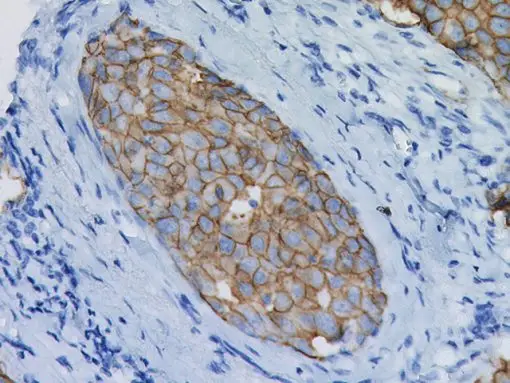Description
The epithelial membrane antigen antibody (EMA) is part of a diverse group of extensively glycosylated transmembrane proteins referred to as human milk fat globule (HMFG) membrane proteins. This antigen family is not exclusive to breast
tissue but can also be present in secretory epithelial cells, albeit to a lesser extent, in non-secretory epithelium (e.g., squamous epithelium) and infrequently in non epithelial cells. EMA is optimally regarded as a broad-spectrum antibody that exhibits reactivity towards several forms of adenocarcinoma. Breast and cutaneous adnexal neoplasms exhibit high positivity. Carcinomas of the endometrium, kidney, thyroid, stomach, pancreas, lung, colon, ovary, prostate, and cervix exhibit a reduced level of staining. Embryonal carcinomas, medullary thyroid carcinomas, squamous carcinomas, sarcomas, lymphomas, and melanomas generally exhibit nonreactivity or demonstrate infrequent positive cells. Transitional cell carcinomas may exhibit modest reactivity, but anaplastic large cell lymphomas can test positive for EMA.

![Epithelial Membrane Antigen (EMA) [E29]](https://www.genebiosolution.com/wp-content/uploads/2025/01/3038.jpg.webp)




